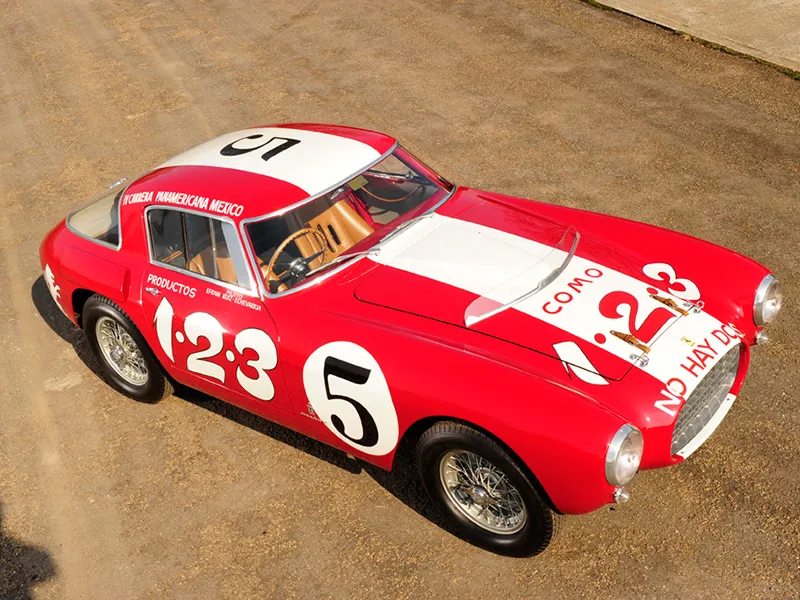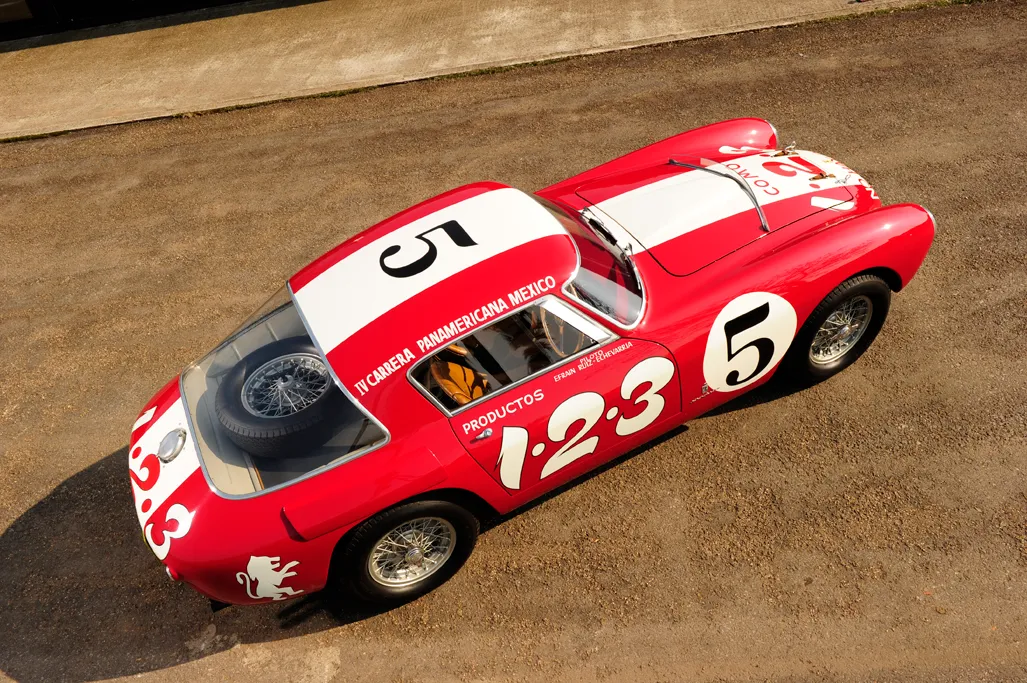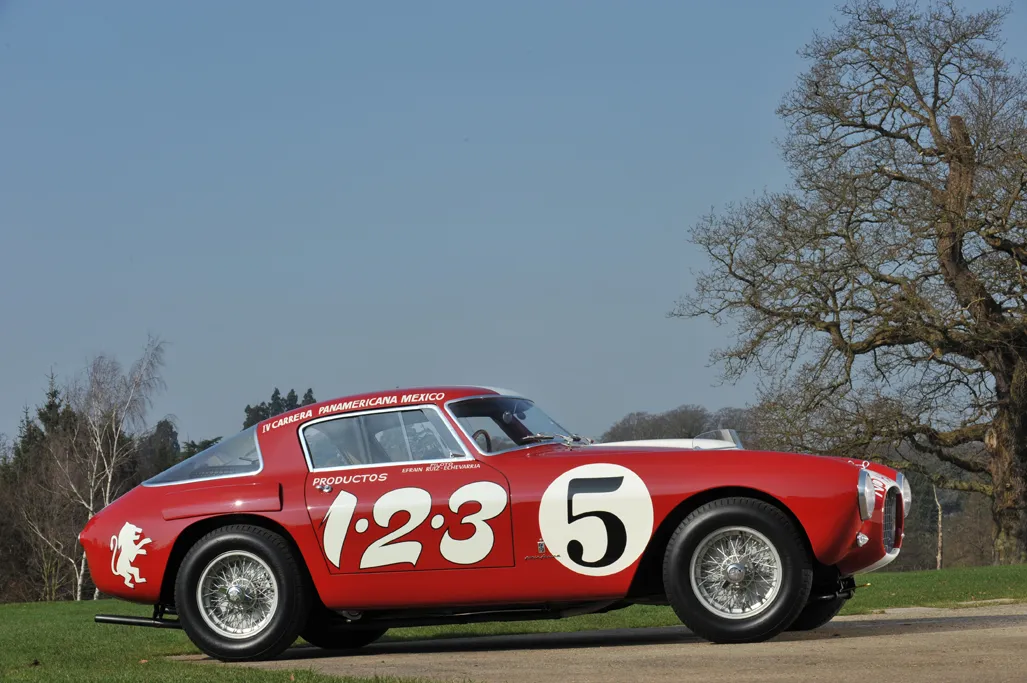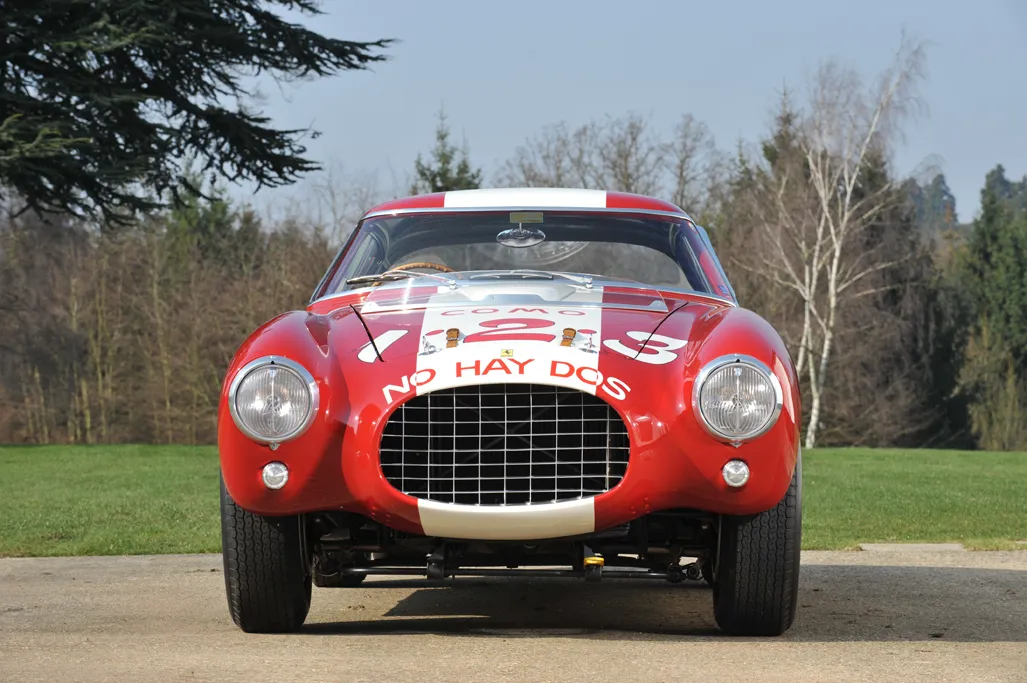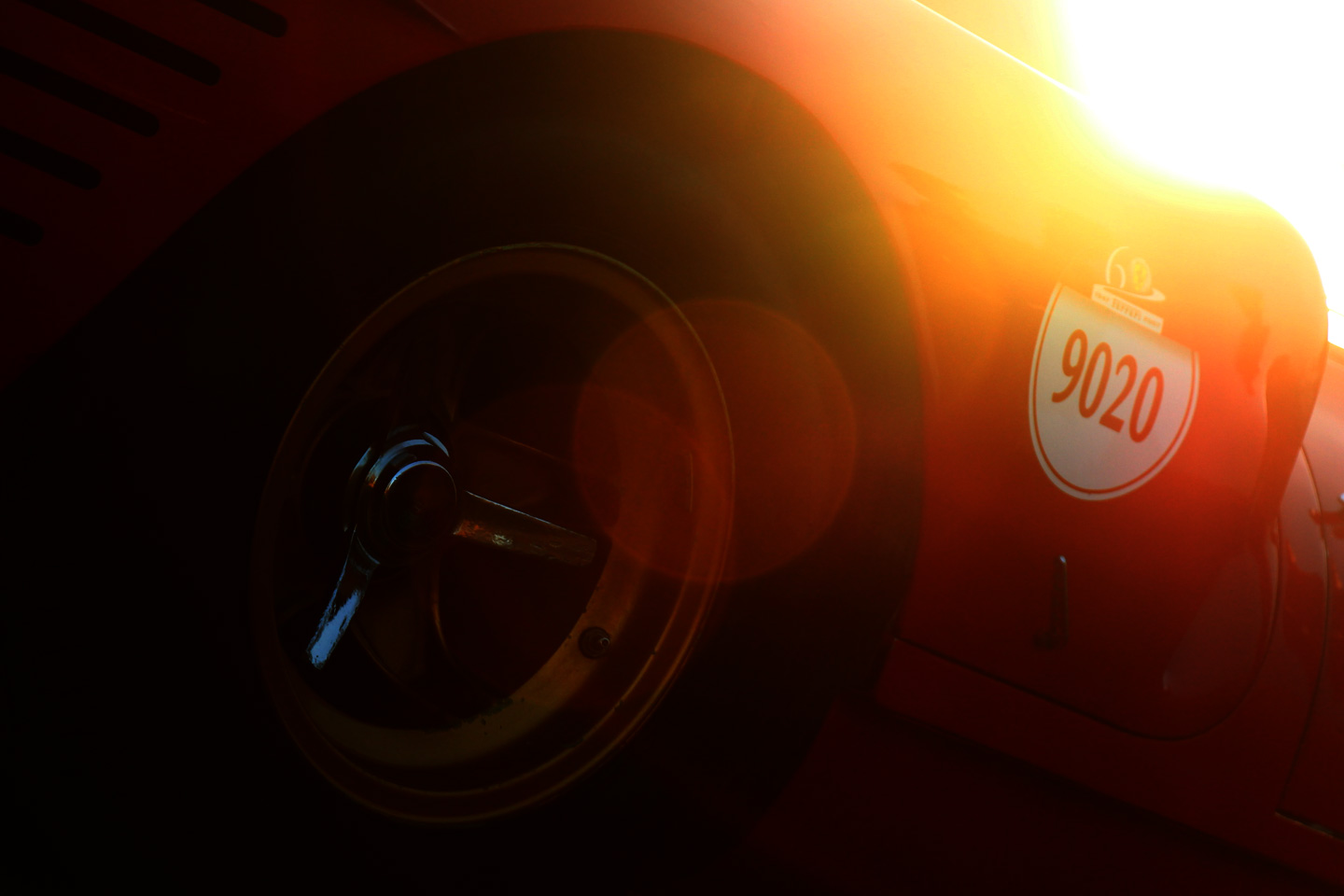Video below:
240 hp, 2,953cc SOHC V12 engine, three Weber carburettors, four-speed manual transmission, independent front suspension with unequal-length A-arms and transverse leaf springs, rear live axle with semi-elliptic leaf springs and trailing arms, four-wheel hydraulic drum brakes. Wheelbase: 2,400 mm (94.5”)
- An original 250 MM with original engine and extraordinary history
- Successfully raced by Efrain Ruiz Echeverria in 1953 Carrera Panamericana
- Best finish by Mexican national in all five years of race
- One of only 18 250 MM PF Berlinettas built
- Hans Tanner Award for Best Ferrari on the field at Pebble Beach
- Recent full restoration my Marque Specialists
- This car can come with full Ferrari Classiche
The 1952 La Carrera Panamericana road race in Mexico was as dangerous as ever, the crisis-to-crisis event filled with fatal accidents, buzzards crashing through windshields and tires shredded on the rough roads. This was not a race for the faint of heart. Although Mercedes’ Gullwing 300SL Coupes enjoyed a one-two finish, Luigi Chinetti was close behind in a Ferrari 340 Mexico and Alberto Ascari was charging ahead in one of the two other sister cars before crashing after 90 miles.
Though the Mercedes team triumphed, the fastest car on the course was Giovanni Bracco in the Ferrari 250 MM Berlinetta prototype. He led the race from the second stage, until his transmission gave out with only 300 miles to go.
Efrain Ruiz Echeverria
This fact was not lost on Efrain Ruiz Echeverria, an ambitious road racer who had privately entered a 212 Inter Berlinetta (chassis 0239 EU) for the race in 1952. He was doing very well, even finishing the second stage ahead of Phil Hill, before skidding off the road on the third stage of the 1,932-mile race, while in tenth place.
Already the fastest Mexican driver, he sent his 212 s/n 0239 EU off to Italy to be repaired, then had a better idea. He contacted Modena and asked them instead to build a new 250 MM for him, just like Bracco’s car.
Import taxes could be prohibitive, especially in South America in the 1940s and ‘50s, so Echeverria asked if his new 250 MM could have the same chassis number as his old 212. Ferrari was used to this international difficulty and complied.
The 1953 Carrera Panamericana
Now in possession of his brand new Ferrari 250 MM, Echeverria attacked the ’53 race head-on, joined by riding mechanic Pedro Villegas.
Competition was fierce. Lancia had prepared a full team effort for the 1953 Carrera, sending five 3-liter roadsters, for Fangio, Taruffi, Bonetto, Bracco, and Castellotti. Five Ferrari Berlinettas were provided by Italian sportsman Franco Cornacchia for Umberto Maglioli, Mario Ricci, Fabrizio Mancini, Antonio Stagnoli and Luigi Chinetti – but weren’t factory cars – while Phil Hill shared another Ferrari with fellow Californian Ritchie Ginther.
Faced with world-class opposition, Echeverria acquitted himself extremely well, and finished in 7th place in the sports car class, as the top privateer and the highest ranking of a Mexican driver in the five years the race was run. Driving on number 5 – the livery in which the car is presented today – he went from 13th place at the end of the first stage to as high as 6th, ahead of Louis Rosier in the Talbot. The race was as frightening and dangerous as ever. There were only 61 finishers of 177 starters, with accidents involving anything from blown tyres, overturned cars and catastrophic fires.
The finishing order was Fangio, Taruffi, Castellotti (all Lancia), Mancini (Ferrari), Rosier (Talbot), Maglioli and Echeverria (Ferrari).
Later History
Echeverria later sold the car to E.R. Stetson in Mexico City in 1956, who kept the car for over ten years. Another enthusiast, Andres Velarde acquired the car in 1967.
In 1975 Ferrari expert Stan Nowak flew to Mexico City from New York to buy four racing cars from Andres Velarde. He purchased three Maseratis, an OSCA and was shown a Ferrari 250 MM, which turned out to be 0352 MM/0239 EU. He documented this extraordinary experience in an article he wrote for Cavallino in December 1979 (“To Mexico with Love”).
Nowak conducted extensive research before finally convincing Velarde to sell the car 18 months later.
S/n 0352 MM/0239 EU was then subjected to a three-year frame-off restoration by Grand Prix SSR Co. in New York and found to be very original. In October 1979 it was sold to Andres Baptista in Mexico City, who already owned the 1951 212 Inter Vignale Berlinetta that was driven to 2nd place in the 1951 Carrera by Alberto Ascari. Baptista managed to track down Efrain Echeverria in Madrid and his riding mechanic in Mexico who confirmed details of the car’s history.
Gary Bobileff then restored the car again for new owner Baptista during the early 1980s.
The combination of s/n 0352 MM/0239 EU’s originality and the quality of the restoration led to a class win at Pebble Beach in 1983 and the Hans Tanner award as the best Ferrari on the field. At that time, the car was in Japanese ownership. Subsequent owners included Ron Kellogg and Mexican industrialist Lorenzo Zambrano.
Fully restored to modern concours-quality “Pebble Beach” standards by Tillack & Company, s/n 0352 MM/0239 EU was shown at Pebble Beach in 2002. It was also shown at the International Ferrari Concours, as Ferrari was the honoured marque at the Monterey Historic races that year.
The car’s performance has been tested in competition since then, including by veteran racer Pablo Gonzales in the 2004 Monterey Historics. All told, only 31 250 MMs were built, all Pinin Farina bodied, with the exception of a Vignale coupe and spyder. Of the Pinin Farina cars, only 18 were berlinettas, including chassis 0352 MM / 0292 EU, which is certainly one of the most fascinating examples in existence. It would be a feat in itself simply to survive the Carrera Panamericana unscathed. A seventh place finish by a privateer can only be chalked up to masterful driving and sheer daring - and the uncovering of its extraordinary history to the expertise of dogged historians. It goes without saying that this car is eligible for virtually any event. What better way to slingshot down the corkscrew at Laguna Seca or fire off the starting block in Brescia?
